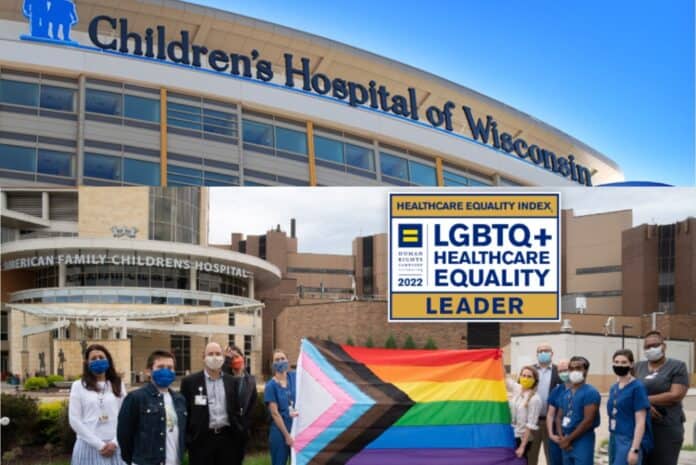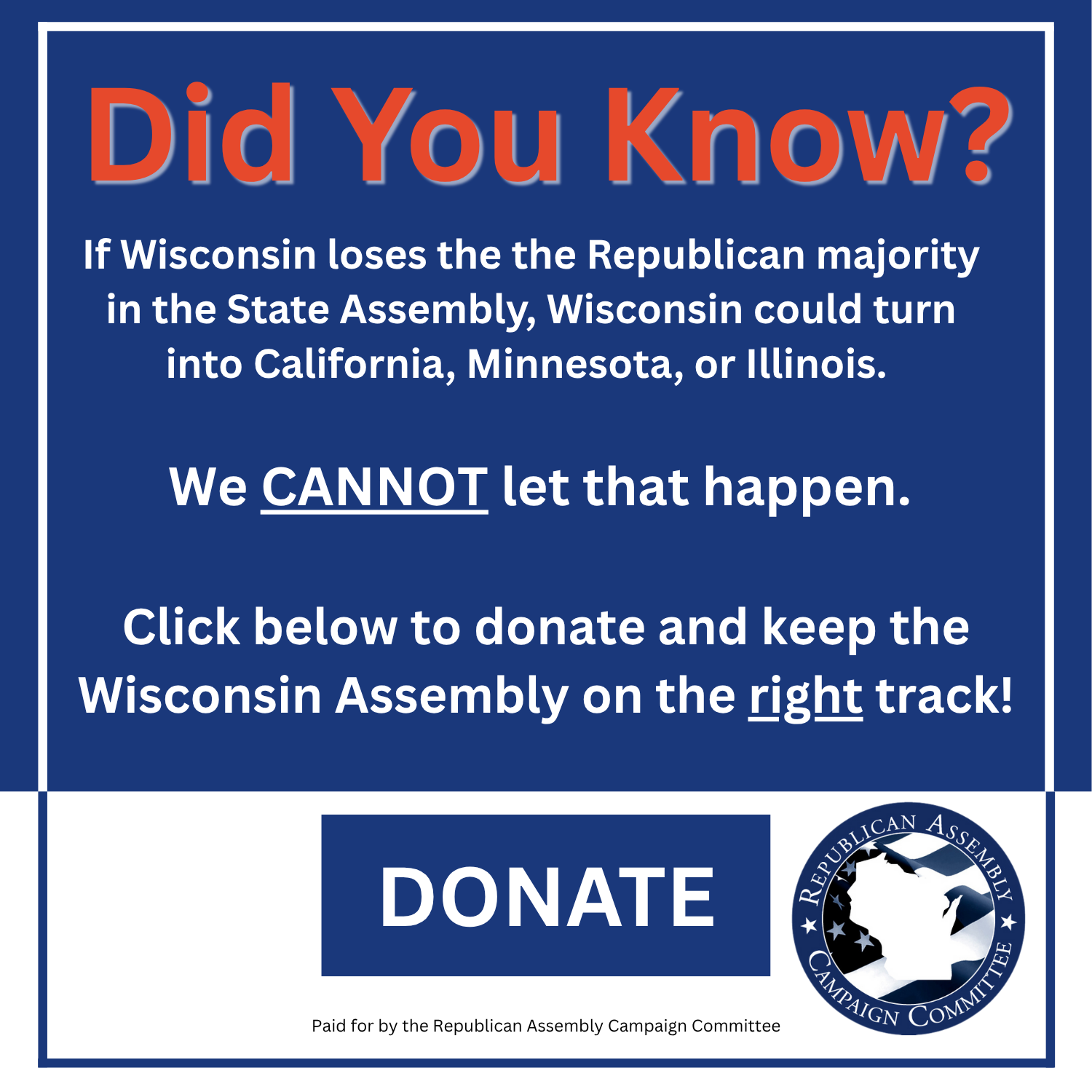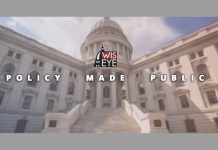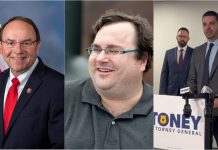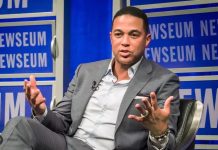Part 1 in a multipart series exploring gender dysphoria treatments for juveniles at Wisconsin hospitals.
More than 260 juveniles received puberty blockers or hormone therapy in recent years from two major Wisconsin hospitals, and up to 15 juveniles underwent breast surgeries every year – in most cases mastectomies – because of “gender dysphoria,” Wisconsin Right Now has documented.
In fact, the numbers are likely much higher because one major hospital, UW Health, only provided a current snapshot of patients being treated, not an annual total. The youngest age was 10 for puberty blockers, 16 for hormone therapies, and 15 for breast surgeries at Children’s Hospital of Wisconsin.
Still, the data makes it clear: Youth under age 18 are receiving surgical and medical intervention for gender dysphoria in Wisconsin, even as a growing body of research is raising concern about such treatments, especially hormone therapies, spurring European countries like Finland to impose new guidelines.
The taxpayers sometimes flip the bill as Medicaid and the State of Wisconsin Standard Benefit plan pay out claims for these procedures, according to an email Children’s Wisconsin Hospital sent a legislator.
The two hospitals say they do not perform genital surgeries on minors; UW Health’s spokesperson says it performs mastectomies on minors but not breast augmentation.
Froedtert Hospital has an inclusion center; its website says it sees patients 15 and older, but that hospital has refused to answer basic questions on the topic despite repeated attempts to clarify whether Froedtert performs surgeries or other gender treatments on minors.
WRN received the statistics on UW Health and Children’s Wisconsin Hospital directly from a hospital spokesperson in one case and from a hospital representative’s email to a legislator, Duey Stroebel, in another.
UW Health performs mastectomies on approximately five to 10 minors each year, Wisconsin Right Now has learned from the hospital spokesperson. In addition, the hospital’s pediatric and adolescent transgender health (PATH) clinic had 126 patients on puberty blockers or hormones, a snapshot of its patients in December 2022 shows. That’s how many patients were being treated at that exact moment at the hospital; the hospital did not provide a figure for the number of patients treated each year.
“We do not perform genital surgery on patients under age 18. Chest masculinization surgery for patients under age 18 is considered only after multidisciplinary evaluation, a letter of support from your mental health provider and with informed consent from all legal guardians,” UW Health says.
Since 2016, Children’s Hospital of Wisconsin, located in Milwaukee, has given puberty blockers or hormone therapy to about 141 minors. Since 2021, the hospital has conducted 11 breast surgeries on minors, both augmentation and mastectomies. The Children’s Hospital website says, “In some cases, our services may include reversible puberty-suppressing hormone therapy, gender-affirming hormone therapy, surgical treatments, and speech/voice training.”
Hospitals often paint these actions as necessary for the mental health of youth with gender dysphoria and position them as lacking harm. Those pushing gender surgeries and treatments for minors sometimes cherrypick studies to back up their points. UW Health’s Drs. Brittany Allen and Jennifer Rehm, who help run the PATH Clinic for Pediatric Gender Identity there, wrote an incendiary politicized column for the Wisconsin State Journal trashing “extremist lawmakers” who “are continuing to push for a ban on lifesaving, gender-affirming health care for transgender youth.”
Congratulations to the #Pediatric and #Adolescent #TransgenderHealth (PATH) clinic for receiving the #LGBTQ organization of the Year Award by @OutReachLGBT The clinic is run by Drs. Brittany Allen and Jennifer Rehm. pic.twitter.com/FqeaC8V8Nd
— University of Wisconsin Department of Pediatrics (@WiscPediatrics) December 12, 2019
However, Wisconsin Right Now has documented, the science is not settled on the effects of hormonal treatments on minors who are dealing with gender dysphoria, both physically and whether the treatments actually improve mental health. In fact, there is growing international concern about the effects of hormone therapies and puberty blocks on minors. Side effects can be serious, not limited to possible infertility or bone density loss.
Furthermore, the guidelines that hospitals – such as Children’s Wisconsin Hospital and UW Health – often rely on to justify their actions were developed by associations that are riddled with conflict-of-interest and ideological bias concerns. We will deal with those points in parts 2 and 3 in greater detail.
According to The Atlantic, public-health officials and scientists in five European countries that once led the way on gender-affirming treatments for children are now reversing course, saying that the science behind these treatments is unproven, benefits unclear, and may do more harm than good. Yet in the United States, the debate is often stifled.
Puberty blockers suppress puberty by stopping the production of estrogen or testosterone. They can stop transgender kids from experiencing the effects of puberty that may not align with their gender identities. Hormone treatments often involve taking estrogen or testosterone.
Hormone therapy for transgender females is intended to feminize patients by changing fat distribution, breast formation, and decreasing male pattern hair growth. Estrogen is a popular therapy for trans female patients, according to the Mayo Clinic.
Children’s Wisconsin Hospital, in a document buried on its website, outlines the potentially irreversible effects of hormonal therapy on juveniles. According to Children’s Wisconsin Hospital, youths may suffer infertility even if the treatment is stopped. Estrogen treatments may shrink testicles to half their size. Sperm may no longer mature, making it hard or impossible to cause pregnancy, and this might be a permanent change, Children’s Hospital acknowledged on the page.
Documents outlining the risks of testosterone and estrogen treatments still appear in Children’s website media file if you search the entire website by keyword in the search bar, but not on the web page for their Gender Health Clinic. In contrast, the clinic web page now reads, “our services may include reversible puberty-suppressing hormone therapy, gender-affirming hormone therapy, surgical treatments, and speech/voice training.”
“Masculinizing hormone therapy typically is used by transgender men and nonbinary people to produce physical changes in the body that are caused by male hormones during puberty. Those changes are called secondary sex characteristics. This hormone therapy helps better align the body with a person’s gender identity,” Mayo Clinic says.
Lack of FDA Approval
“Puberty blockers and sex hormones do not have U.S. Food and Drug Administration (FDA) approval for children’s gender” dysphoria, Reuters reported in 2022, underscoring some of the growing concerns. However, some of the drugs are approved by the FDA to treat minors for other conditions, such as premature puberty.
“No clinical trials have established their safety for such off-label use. The drugs’ long-term effects on fertility and sexual function remain unclear,” Reuters said.
The article notes, “More broadly, no large-scale studies have tracked people who received gender-related medical care as children to determine how many remained satisfied with their treatment as they aged and how many eventually regretted transitioning.”
Scientists did follow up with 139 gender dysphoric boys from 1989-2002 and found that 88% of boys outgrow gender dysphoria by age 20 1/2.
“Persons with transsexualism, after sex reassignment, have considerably higher risks for mortality, suicidal behaviour, and psychiatric morbidity than the general population,” that study found. “Our findings suggest that sex reassignment, although alleviating gender dysphoria, may not suffice as treatment for transsexualism, and should inspire improved psychiatric and somatic care after sex reassignment for this patient group.”
The National Institutes of Health, the U.S. government agency in charge of medical and public health research, told Reuters that “the evidence is limited on whether these treatments pose short- or long-term health risks for transgender and other gender-diverse adolescents.”
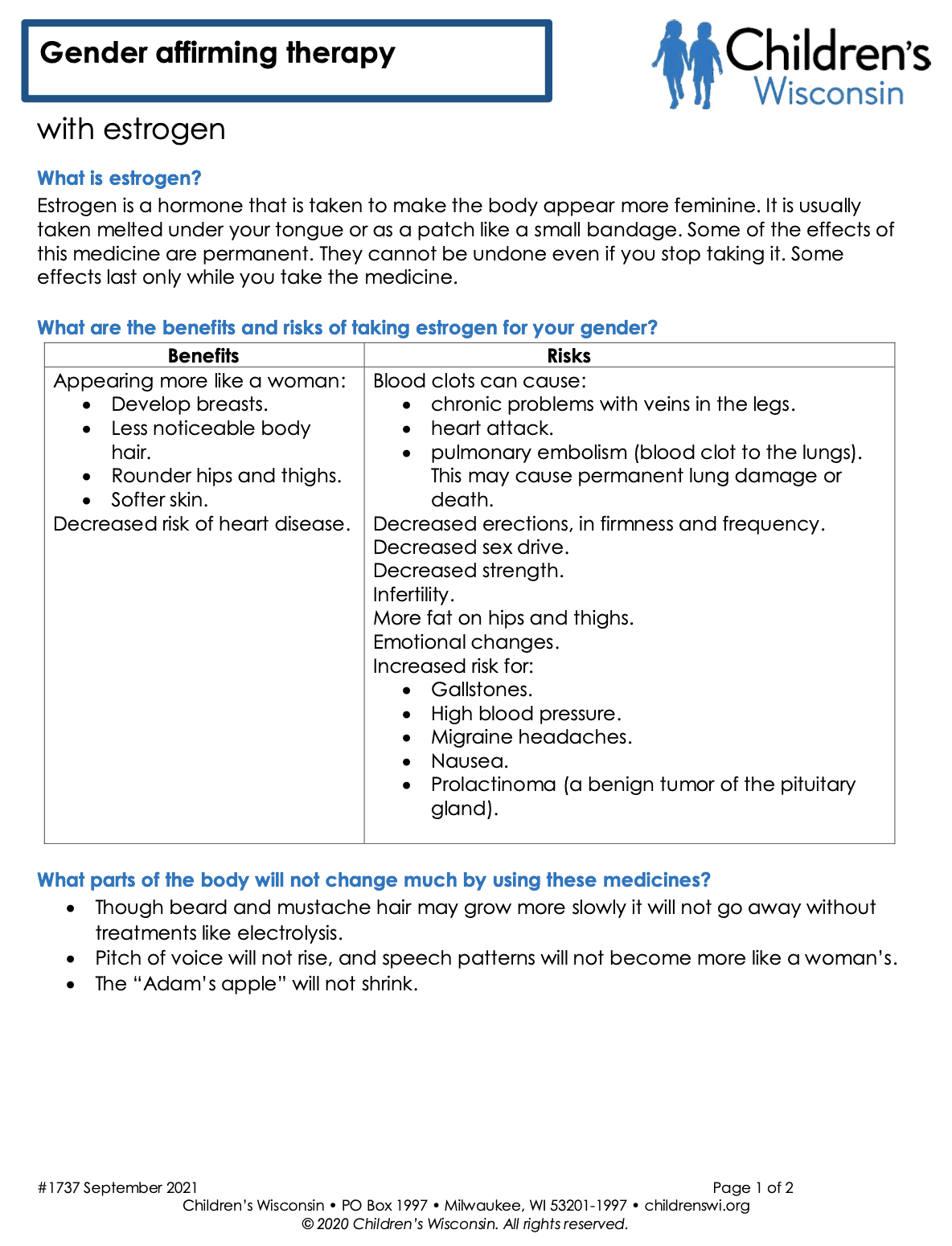
According to Children’s Wisconsin web pages, the risks for estrogen treatments include chronic leg vein problems, heart attack, blood clots to the lungs, decreased strength, decreased sex drive, infertility, and increased risks for gallstones, high blood pressure, migraine headaches, nausea, and benign pituitary tumors.
Testosterone can cause serious side effects, even after its use is stopped. According to Children’s Wisconsin’s web pages and backed up by other research, those effects may include an inability to get pregnant; a large clitoris, a half inch to over an inch; a deeper voice; slow-growth mustache and beard; complete baldness; and thick course hair on the back, abdomen, legs, and chest.
There are also side effects to ongoing testosterone hormone therapy, including weight gain, sleep apnea, and increased risk of heart problems, diabetes, and blood clots, according to Mayo Clinic.
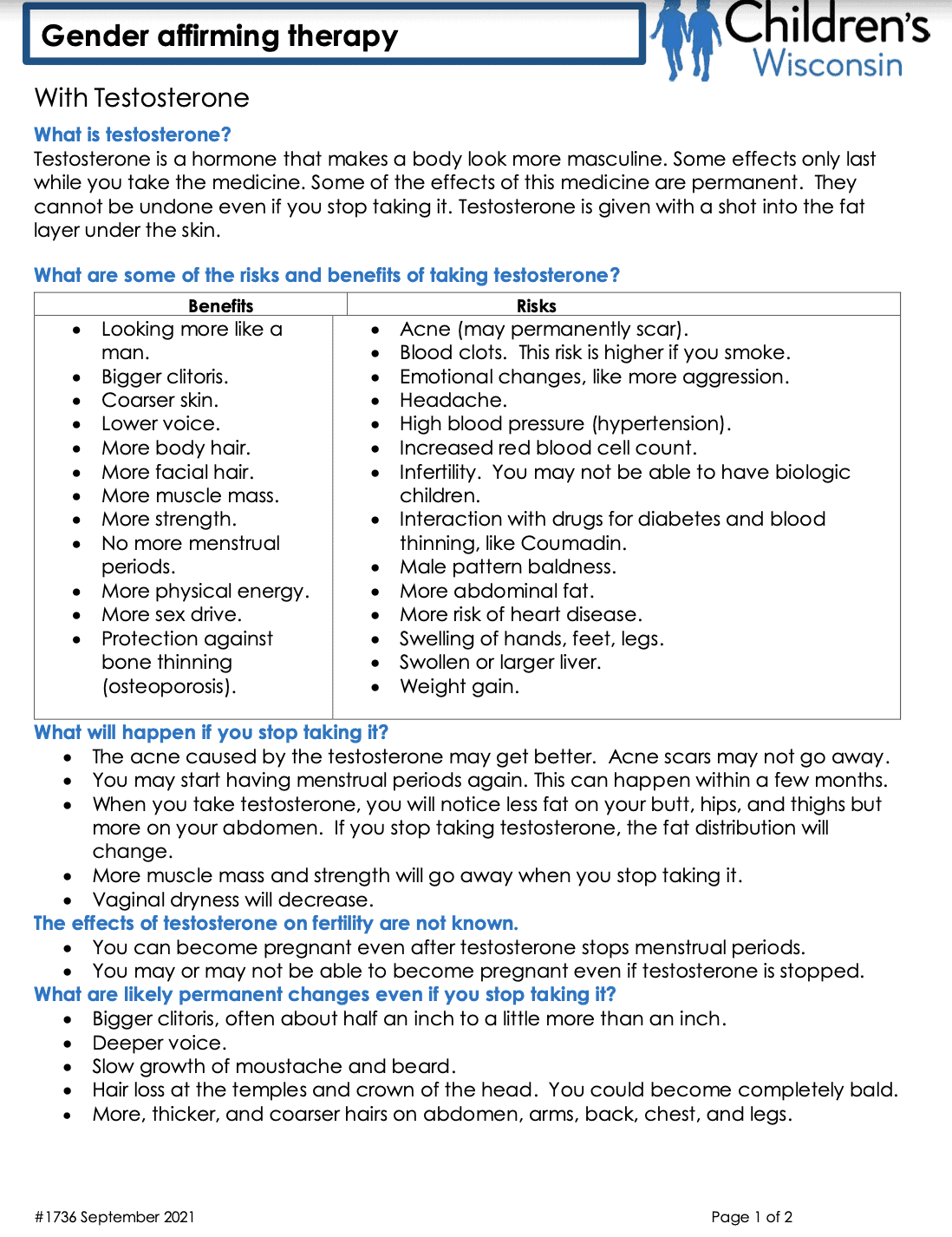
Another page tells the personal story of a youth who received testosterone at Children’s Wisconsin Hospital and reads, “So when Jasper first came out as a lesbian, he knew they would be supportive.” Jasper, who was born in 2006, then came out as non-binary and then as transgender, the website screenshot says. It says Jasper started receiving testosterone injections in 2020.
“Testosterone hormone treatment has several effects on a person who was assigned the sex of female at birth,” the Children’s Hospital website’s post reads. “The first is physical; menstruation stops, muscle mass grows, the voice deepens, body fat redistributes and body hair increases.”
The story chastised the parents of youth whom the doctors would never meet because “their families aren’t ready to be supportive” like Jasper’s. Because of such parental opposition, which it called a “sad reality,” Children’s Hospital wrote, “from the very beginning the Gender Health Clinic has had an open doors policy, meaning they’ll see anyone at any point of their journey.” The website cites a Wisconsin study finding that 62% of transgender and nonbinary youth had contemplated suicide compared to 18% for all youth. To protect Jasper’s identity, WRN has decided not to publish that web page screenshot, which included photos of Jasper.
Here is an informational pamphlet from Children’s Wisconsin Hospital about what to expect at the gender clinic. Note that the first part describes “clinical visit for children who have not started puberty or are in the early/mid stages of puberty.”
The pamphlet, which is called “what to expect in the Gender Health Clinic,” says that testosterone and estrogen treatments require a letter of support from a mental health provider, and the support and informed written consent of the legal guardian. Puberty blockers may be prescribed at the first visit. A letter of support from a mental health provider was not required, at least at that time.
The website says Children’s Wisconsin Hospital’s Gender Health Clinic was created in January 2016 by Susanne Cabrera MD, a pediatric endocrinologist. The page said the clinic saw more than 35 youths a month.
The numbers are exploding nationwide.
According to MedPage Today, chest surgeries of minors have grown 389% to 1,130 from 2016 to 2019. Public health insurance accounted for 16.5 percent, and the cost was about $30,000. More than 77% were white. According to Reuters, the number of children diagnosed with “gender dysphoria” in 2021 was 42,000, tripling since 2017.
In March, the Biden administration “issued a letter to all state attorneys general reminding them of federal constitutional and statutory provisions that protect transgender youth against discrimination, including when those youth seek gender-affirming care,” according to a Justice Department press release. The White House has taken numerous steps to advance what it calls “gender affirming care.”
Here are additional details on the numbers.
UW Health Hospital
According to a UW Health spokesperson, Sara Benzel, as of December 2022, there were approximately 315 patients at UW Health’s pediatric and adolescent transgender health (PATH) clinic. About 40%, or 126, were on puberty blockers or hormones.
Benzel further told us that UW Health does not perform and has never performed bottom surgery or breast augmentation surgery on minors.
UW Health performs top surgeries (mastectomies) on approximately five to 10 teenage patients under the age of 18 per year only after multidisciplinary evaluation, long-term engagement in mental health care and a requisite letter from their primary therapist, duration of hormonal therapy if indicated, and consent from legal guardian(s).
According to their website,
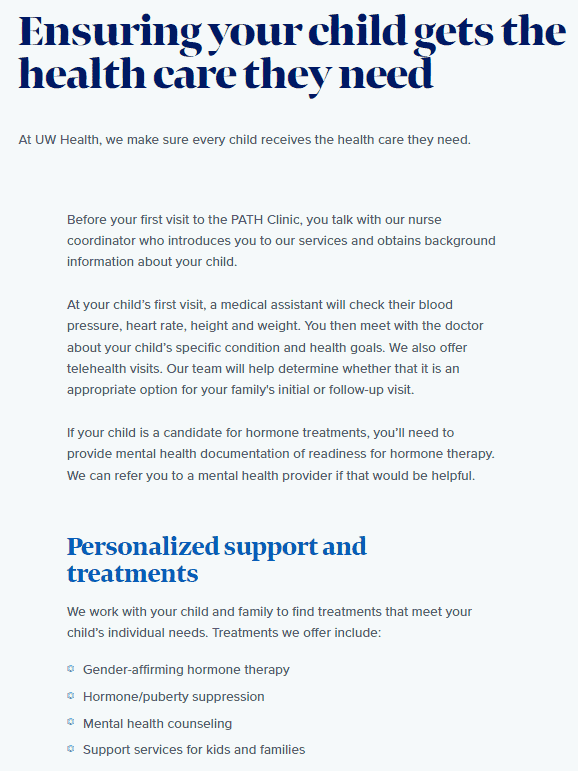
We asked if UW Health has conducted any follow-up studies on PATH Clinic patients to look at satisfaction rates, depression (before and after), suicide, de-transitioning, and so forth.
Benzel responded, “Like many programs at UW Health, the PATH clinic actively works to survey and evaluate patient satisfaction and experience. In addition, we have a patient registry where we collect information on all aspects of patient care and actively review this data to ensure that we’re providing evidence-based, patient-centered quality care to all the patients and families in our clinics.”
“We rely on best practice standards and guidelines from organizations such as the WPATH, Pediatric Endocrine Society and Endocrine Society.”
Children’s Wisconsin Hospital
We reached out to Children’s Wisconsin several times asking them to explain in detail their transgender surgeries and treatments, but they never responded.
However, in an October 2022 email exclusively obtained by WRN between State Senator Duey Stroebel and Children’s Wisconsin’s government PR Director Jodi Bloch, Bloch revealed the following:
Over the six years of the Children’s Wisconsin’s Gender Health Clinic (GHC), 461 patients and families have been seen.
There is no minimum age to receive mental and behavioral health support. The average age of new patients to the GHC is 14-15.
- 2020 – 63 patients
- 2021 – 85 patients
- 2022 through June – 65 patients
Of the 461 seen in initial consultations since 2016, 282 have returned for further care. About 141 of those, (50%) have been started on pubertal blockers or hormone therapy.
Surgical: Children’s Wisconsin does breast surgeries. The average age of its surgical patients is 17 and the youngest was 15, according to the email. It is unclear from the email how many, if not all, are double mastectomies. The consent of both parents or guardians, statements of support from a mental health provider and a medical caregiver outside the GHC clinic, and ongoing extensive evaluations over time are required before proceeding.
There have been 11 breast surgeries performed since 2021: 6 in 2021 and 5 in 2022 (as of Oct. 2022.) These consist of mastectomy and breast augmentation.
Children’s says it does not perform genital surgery.
The minimum age to be considered for puberty blockers is with the onset of puberty, which varies by child. The average age is 10-11 for girls and 11-12 for boys. These are temporary and reversible and require thorough evaluation before being administered and the approval of both parents.
Hormone Therapy: The average age for hormone therapy is 16-17; the youngest 13.
Gender Health Clinic services are generally paid through:
a) Medicaid
b) State of Wisconsin Standard Benefit Plan
c) Employer-Provided Health Insurance
All services provided by the GHC have been covered by the payers listed there.
The 5 most common chemicals/prescription medications prescribed:
- Testosterone – masculinization of the body.
- Estrogen – feminization of body.
- Spironolactone – Anti-androgen used in conjunction with estrogen therapy to reduce testosterone levels
- Leuprolide – pubertal blocker: It pauses pubertal changes to allow the patient and family time to engage in therapy and consider if further medical intervention is warranted or not. This is reversible and once stop taking, puberty onset begins and progresses.
- Histrelin – pubertal blocker. This is reversible and once stop taking, puberty onset begins and progresses.
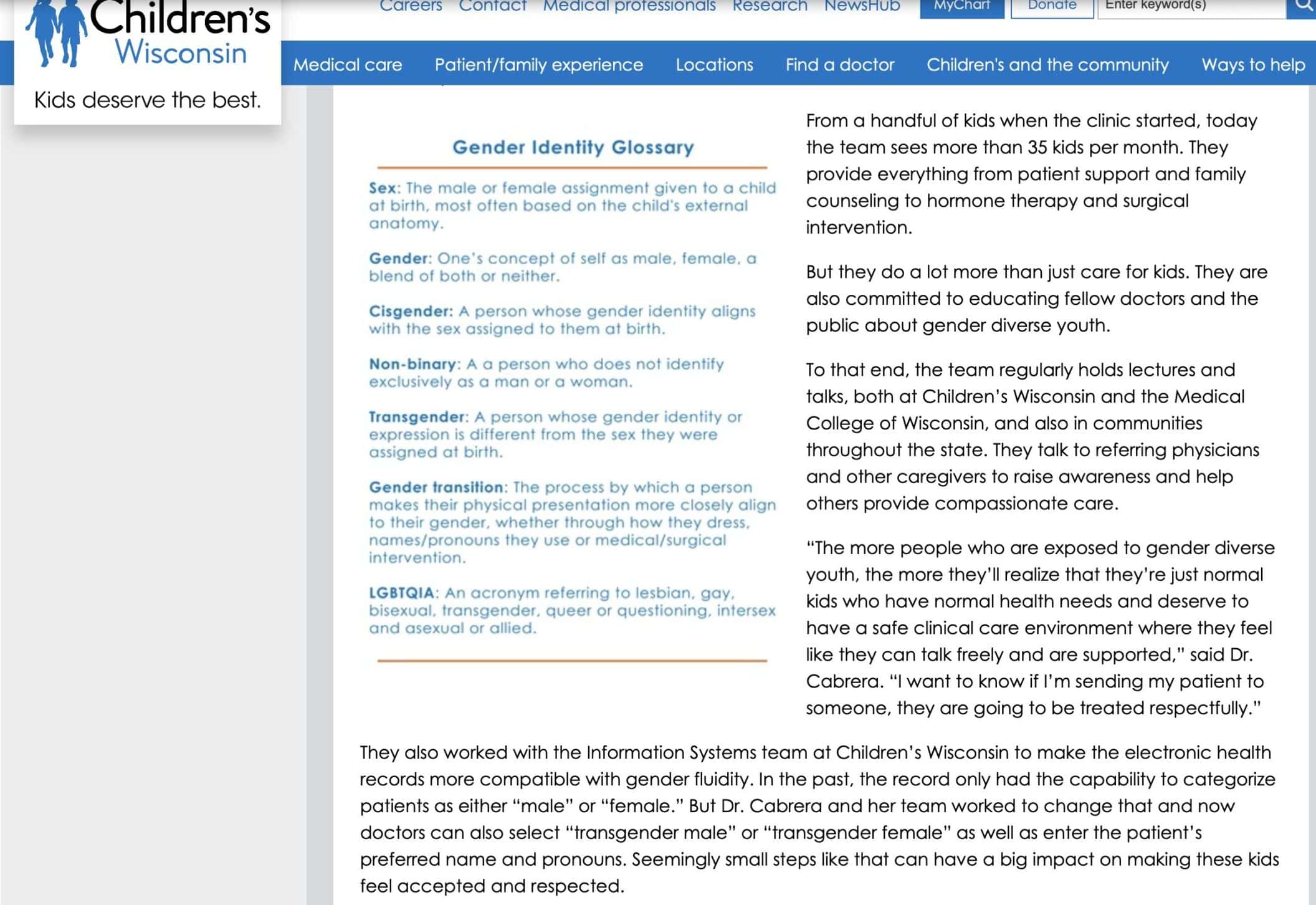

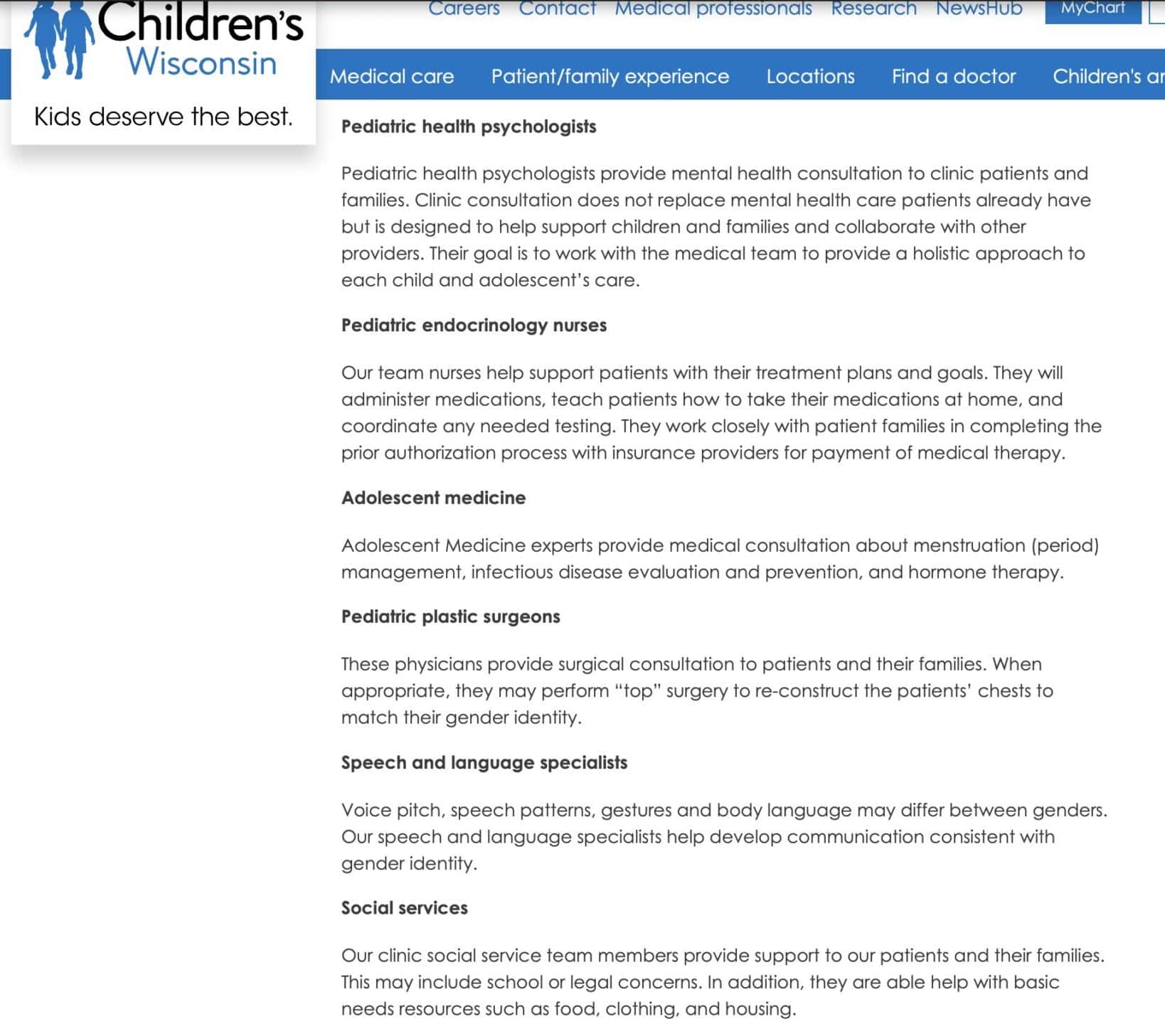
Froedtert Hospital
Froedtert Hospital has refused multiple requests for comment and questions regarding their Inclusion Health Clinic’s treatment of transgender children.
According to its website, Froedtert Hospital’s Inclusion Health Clinics is “recognized as a national leader in LGBTQ health care equality, our providers offer the highest standard of medical care to the LGBTQ community, including our Inclusion Health Clinics, specifically designed to comprehensively meet the health care needs of the LGBTQ community.”
In the FAQ portion of the Inclusion Health Clinic website, under the question, “Does the clinic offer gender-affirming surgeries?” The response is,
“There are many kinds of gender-affirming surgical procedures, such as facial feminization, tracheal shave, breast augmentation or reduction, body contouring, orchiectomy, vaginoplasty, metoidioplasty and phalloplasty.”
Under the question, “What age of patients do you see?”, the response is,
“We can see patients age 15 and older. If your child would like to be seen at the Inclusion Health Clinic, please make an appointment with one of our providers and bring the medications your child is taking to the appointment. We will have you sign a release of information form to get prior records if we cannot see them in your child’s medical record. We can answer any additional questions at your first visit.”


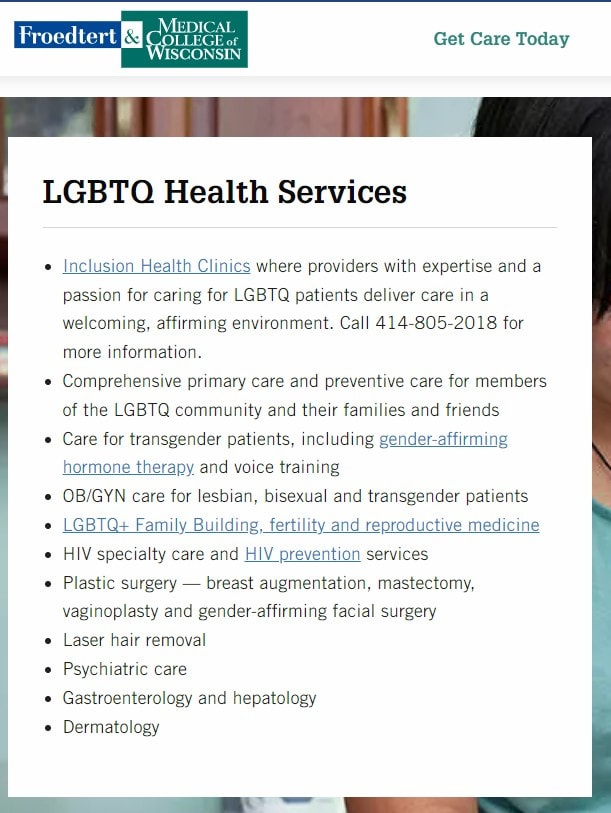
What are Puberty Blockers?
According to MayoClinic.org, the class of medications are called gonadotropin-releasing hormone agonists, or GnRH agonists. The Food and Drug Administration approved them to treat precocious puberty, which means puberty occurs unusually early. They suppress the body’s release of sex hormones, including testosterone and estrogen, during puberty.
In biological males, GnRH agonists decrease the growth of facial and body hair, prevent voice deepening, and limit the growth of genitalia.
In biological females, treatment limits or stops breast development and stops menstruation.
According to the Mayo Clinic, use of GnRH analogues may have long-term effects on:
- Growth spurts
- Bone growth and density
- Future fertility — depending on when pubertal blockers are started
It was noted that biological male children who use GnRH agonists early in puberty may not develop enough penile and scrotal skin for certain gender surgeries on the genitals, such as penile inversion vaginoplasty.
There are Facebook Groups dedicated to victims of Lupron.
Are Puberty Blockers Safe?
Some experts believe puberty blockers are safe. The Endocrine Society and the World Professional Association for Transgender Health support the use of puberty blockers for children who want to delay or prevent unwanted physical changes. However, as we will document in part 3, those organizations are controversial.
Table of Contents


